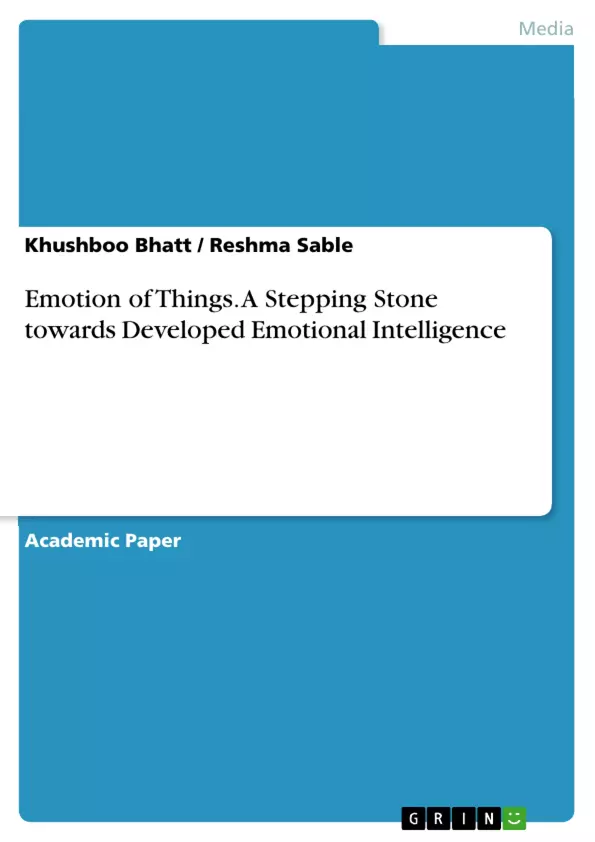This paper will elaborate on why the emotion of things is important and how Emotional and Artificial Intelligence will be connected. The objective of this study is to review the challenges faced by the internet of things due to the lack of involvement of emotional aspects. The study will be based on reviewing various literature to identify the key issues and will focus on suggesting suitable solutions for those issues.
With a hike in the Internet of Things and Artificial Intelligence, Globe needs to focus on the Natural Intelligence and Human aspect of Intelligence i.e., part of Emotional Intelligence. Recently, while addressing the students of IIT Kanpur, at the 54th Convocation, the Prime Minister of India quoted that “You must think about artificial intelligence but also think about human intelligence.” The Emotion of things consists of emotional objects and skills a person possesses for understanding. Under the umbrella of emotional intelligence, the emotion of things deals with the ability to understand, recognize and communicate the emotions and responses with self and others. This paper will elaborate on why the emotion of things is important and how Emotional and Artificial Intelligence will be connected. The objective of this study is to review the challenges faced by the internet of things due to the lack of involvement of emotional aspects. The study will be based on reviewing various literature to identify the key issues and will focus on suggesting suitable solutions for those issues.
Inhaltsverzeichnis (Table of Contents)
- Introduction
- Literature Review
- Research Gap
Zielsetzung und Themenschwerpunkte (Objectives and Key Themes)
This research aims to investigate the impact of technological advancement on human life, particularly in the context of emotional intelligence. It explores the perception of individuals regarding Artificial Intelligence (AI) and its effects on emotions, feelings, and overall human experience. The study aims to develop a model of Balanced Emotional Intelligence to address the challenges posed by the increasing integration of AI in our lives.
- The impact of technological advancement on human life and emotional intelligence.
- Individual perceptions of AI and its effects on emotions and human well-being.
- The importance of developing Balanced Emotional Intelligence in a technologically driven world.
- The role of "emotion of things" in bridging the gap between human and artificial intelligence.
- The need to integrate emotional aspects into the development and application of AI technologies.
Zusammenfassung der Kapitel (Chapter Summaries)
- Introduction: This chapter introduces the concept of "emotion of things" and its relevance in the context of increasing reliance on AI and the Internet of Things (IoT). It highlights the importance of understanding and managing emotions in the face of technological advancements.
- Literature Review: This chapter examines various research studies and theories related to emotional intelligence (EI) and its significance in human behavior and interaction. It explores different models of EI, including those proposed by Mayer & Salovey, Goleman, and Bar-On.
- Research Gap: This chapter discusses the growing gap between technological advancement and the preservation of human emotional well-being. It analyzes how technological reforms have influenced the "presence of mind" of individuals and identifies the need for developing balanced emotional intelligence to address these concerns.
Schlüsselwörter (Keywords)
This research focuses on key terms such as emotion of things, emotional intelligence, human intelligence, Internet of Things, and Artificial Intelligence. It explores the challenges and opportunities associated with integrating emotional aspects into a technologically driven world. The study emphasizes the importance of developing balanced emotional intelligence to navigate the evolving relationship between humans and AI.
Frequently Asked Questions
What is the "Emotion of Things"?
The "emotion of things" refers to the integration of emotional intelligence into objects and artificial systems, enabling them to understand, recognize, and communicate emotions.
How are Artificial Intelligence (AI) and Emotional Intelligence (EI) connected?
EI provides the human aspect of intelligence that AI currently lacks. Connecting them allows for more natural and empathetic interactions between humans and technology.
What are the challenges of the Internet of Things (IoT) regarding emotions?
A major challenge is the lack of emotional involvement in IoT devices, which can lead to a gap in user experience and well-being.
What is "Balanced Emotional Intelligence"?
It is a model developed to address the impact of technological advancement on human emotions, ensuring that human intelligence remains central in an AI-driven world.
Why is human intelligence important for technological progress?
As emphasized by leaders like the PM of India, technology must serve human needs; therefore, human intelligence must guide the development of AI to preserve emotional well-being.
- Quote paper
- Khushboo Bhatt (Author), Reshma Sable (Author), 2023, Emotion of Things. A Stepping Stone towards Developed Emotional Intelligence, Munich, GRIN Verlag, https://www.hausarbeiten.de/document/1337093


